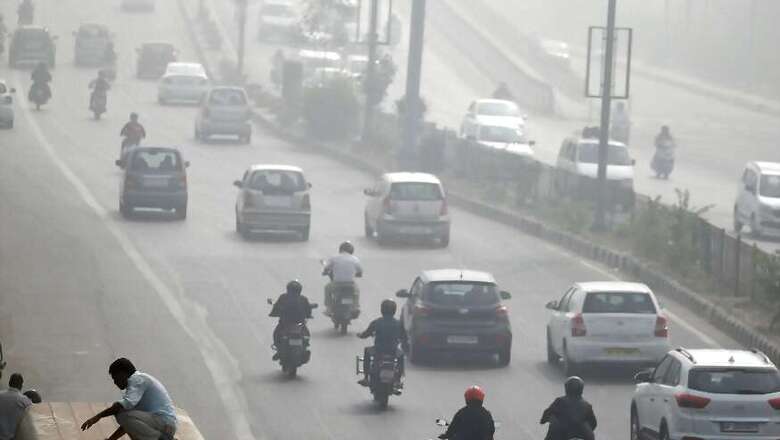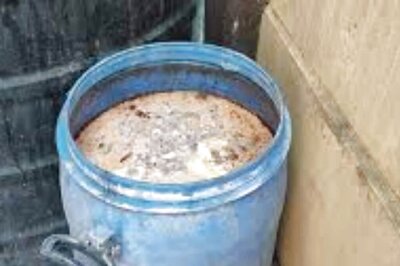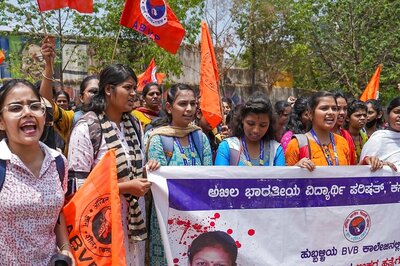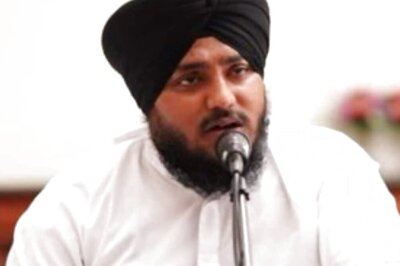
views
New Delhi: The Supreme Court today described the issue of vehicular pollution as "very serious" and a "critical problem" and observed that it would have an impact not only on this generation but also on the children yet to be born. The apex court said the government could not take the issue lightly and directed the Ministry of Petroleum and Natural Gas (MoPNG) to file an affidavit, indicating the position as regards the availability of Bharat Stage (BS)-VI emission standard compliant fuel in Delhi.
BS-VI emission standard is scheduled to come into force from April 1, 2020, across the country. A bench comprising justices Madan B Lokur and Deepak Gupta asked the Ministry of Environment, Forest and Climate Change (MoEF&CC) whether any study was conducted on environmental pollution, its effect on the health of people and the cost to deal with it.
Additional Solicitor General (ASG) A N S Nadkarni, appearing for the MoEF&CC, said a study was underway and that he would get back to the court with its details. To this, the bench said if the government did not have any material of its own and said that a scientific study carried out by any foreign scientist on the issue was useless, then it was creating a problem for itself as well as the people.
"It is a very, very serious matter. It is a critical problem. It is going to impact children who are already born and who are going to be born. We do not think that the Government of India will take it so lightly. "It will have an impact for generations. There are slogans of sustainable development but this is very serious," the bench observed.
Advocate Aparajita Singh, assisting the court as an amicus curiae (friend of the court), told the bench that the BS-VI norms should be made applicable in the Delhi-national capital region (NCR) from April 1, 2019 as the government itself had acknowledged that the people were suffering due to pollution.
She also questioned the April 1, 2020 timeline for the BS-VI norms and first a three-month and then a six-month time given to the automobile dealers thereafter to clear the existing stock of BS-IV vehicles.
"They cannot take the health of citizens so lightly," Singh said, adding that as per the Centre's affidavit, Rs 80,000 crore were spent on the BS-VI norms. She also raked up the issue of electric cars in India and asked that when the manufacturers were able to make these cars, then why they could not shift to the BS-VI norms earlier.
Singh also said that cars, which were not BS-VI compliant, should not be allowed to be registered after the new norms came into effect. Referring to data, she said pollution would come down by around 80 percent in case of the BS-VI vehicles, as compared to the BS-IV ones.
She referred to the MoEF's affidavit in this regard and told the court that the ministry should be asked to clarify its stand as to whether it was "batting for the citizens of Delhi or the car manufacturers". Nadkarni said he would take instructions on the time given after April 1, 2020 to clear the stock of vehicles which were not BS-VI compliant and were manufactured before March 31, 2020.
When the bench asked the ASG if the government could stop the registration of vehicles which were not BS-VI compliant from April 1, 2020, he said he would take instruction on it. Senior Advocate Gopal Subramanium, appearing for Mercedes, said the initial date to shift to BS-VI was 2024 but it was fixed at April 1, 2020 after many deliberations.
"All of us are in the process. We are sitting with the oil companies and telling them how they can modify their fuel for it to be less pollutant for the EURO-VI (BS-VI) vehicles," he said. Subramanium added that though the timeline was April 1, 2020 for the BS-VI compliant vehicles, the issue was the availability of BS-VI fuel throughout the country.
A lawyer, appearing for an automobile manufacturers' association, told the court that if BS-VI fuel was not made available, it would have an adverse impact on the BS-VI vehicles.
Regarding electric cars, the lawyer said the disposal of the batteries of these vehicles would be a big problem in India and would cause more pollution. He added that only six countries, including Norway and the Netherlands, had touched the market share of about one percent electric cars, but the number of vehicles in these countries was much less.
As regards two-wheelers, the lawyer said to achieve the BS-VI norms, the technology had to be changed and that India would be the first country to do it in 2020. Meanwhile, the amicus curie said the apex court-mandated Environment Pollution Control Authority (EPCA) had suggested that vehicles, which were not BS-VI compliant, should not be allowed to be registered after April 1, 2020.
The bench, after hearing the submissions, asked the MoPNG to file its affidavit within two weeks and observed that the "real issue was to improve the public transport system". The apex court had, in March last year, banned the sale and registration of vehicles, which were not BS-IV compliant, in India from April 1, 2017 when the new emission norms came into force. It had observed that the health of the people was "far, far more important than the commercial interests" of the manufacturers.




















Comments
0 comment